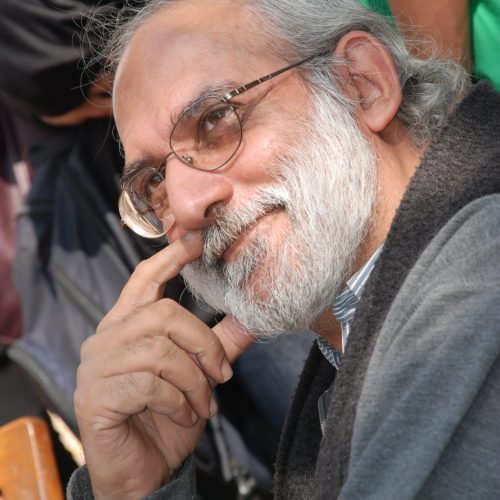What do theatre awards really do for practitioners and the community they inhabit? Here’s a closer look.
Prachi Sibal
Vikrant Thakar, a Mumbai-based lighting designer was not nominated for the Mahindra Excellence in Theatre Awards (META) this year. However, the jury changed its mind at the festival that preceded the awards ceremony. Thakar took away the award for Best Lighting Design for Hunkaro, a production by Ujaagar Dramatic Association. This was his first nomination and award at the META, the country’s only pan-India professional theatre award.

Ever since Thakar has received an outpouring of congratulatory messages. It is also the ultimate validation following the long road from collegiate theatre to the professional stage. Does it necessarily mean more professional engagements for Thakar? He isn’t sure of that. “But people know you are among the best. Besides, my plate is full with the projects I have already been commissioned”, he says.
Awards and the individual
While META may be the foremost contemporary Indian theatre award, competition in the collegiate circuit, both vernacular and in widely spoken languages like English and Hindi, is rampant.
Professional theatre awards serve the basic purpose of validation and prestige in a largely thankless industry, and there is often a cash prize attached. Vikram Phukan, theatre-maker, and critic, who was part of the selection committee at META 2023 tells us that the prize does go a long way in an otherwise cash-trapped industry and may get injected back into producing new work.
While most theatre-makers we spoke to believe that the accolades and limelight help in validating the artists’ work, they rarely lead to tangible outcomes of more projects for the individual or group in question.

“As a playwright, it may help you get published,” says Toral Shah, Partner, and creative director, QTP. She also makes a case for relatively non-competitive awards by institutions such as the Sangeet Natak Akademi Award, Shankar Nag Award, and other Lifetime Achievement Awards. “They are much more prestigious and give the artist a greater boost than competitive ones. Most people receive these awards in their forties or fifties and have many years of their careers ahead. It’s recognition for the body of work you have produced and validates your career choice,” she says.
Awards and the production
Best Play, Best Ensemble, Best Production Design, there are numerous awards at various festivals, that serve to establish a play’s credentials within the competing sphere. Do the fortunes of a production turn after an award?
Veteran actor and artistic director of Aadyam, Shernaz Patel, believes that awards do establish a certain curiosity about the production. “The quality logically goes up and it may lead to more audiences for that particular play,” she says adding that following the pandemic everyone needs that kind of encouragement.
With some festivals being pan-India, this may especially be the case, Shah tells us, for plays looking to expand their audiences to different regions. “If a play from Guwahati comes to Mumbai, and it has won an award, people will be more open to checking it out,” she says.
It’s not often that you see awards being mentioned on play posters in Mumbai and Phukan tells us that the value derived from them depends on how the group makes use of them. “Unlike the Oscars or other film awards, there is no constant replaying of it. If used effectively in a campaign, the award-winning production might garner more attention. At the end of the day, it is about the perception you build,” he says adding that it may also be a product of the region. “In Pune, META is big, as it is in Assam. But, in Mumbai, it may not really make a difference”.
It also depends on the type of theatre award and how invested the audience, beyond the theatre community, is in the results.
For instance, in Marathi theatre, especially in the cities of Mumbai and Pune, major awards are coveted and trophies are displayed with pride on posters. “They were used extensively in print ads and are now being used on social media. For people to come and watch a play, being an award-winner really helps,” says Nipun Dharmadhikari, Marathi writer, actor, and director.

Awards and the community
Individuals and productions aside, most awards, whether they fit into the vernacular, experimental, or youth categories, aspire to serve the larger theatre community. Often, festivals precede an award ceremony, where a jury is able to adjudge plays under set categories. These may be ticketed public shows as in the case of Thespo, or open to an inter-collegiate audience in student competitions.

The atmosphere is rife with art and dialogue, and a vibrancy abounds these spaces. “Festivals are definitely the way to go. There is a certain energy and motivation that comes with it,” says Delhi-based Keval Arora, faculty advisor, The Players, Kirori Mal College.
But he believes that this sense of community does not always extend to the awards. “Most competitions are loaded against the spirit of togetherness. When you look at another college and its play as an adversary that denies you your place in the sun, then you can only resent that play, or admire it for cherry-picking what you could have yourself done. It ends up corroding that collaborative space which is vital to making theatre,” he says about theatre competitions in general, and those at Delhi University.
Theatre-makers are all in favour of festivals as community-building platforms and choose to see the value they bring even when leading up to award functions. The example of Thespo which has proven to be a youth movement larger than its competitive exercise comes up frequently as an example.
Anuja Ghosalkar, Bangalore-based theatre-maker, is wary of theatre awards and fears the building of an awards aesthetic.
“Are we replicating a Bollywoodised form of awards? Does it standardise a form of doing theatre?” are some of the questions she has and strongly believes a more equitable method that rewards experimental work and community-building may be the need of the hour.

The conversation on theatre awards in the community doesn’t end with listing out their pros and cons. Every award has a selection process and juries attached to it. Some look to add value to this exercise through feedback mechanisms and workshops, while others simply focus on its celebratory aspects.
It’s abundantly clear that awards serve an inherent and basic cause, that of bringing attention, albeit short-lived, to the form and its practitioners. Can they serve a larger purpose than the competition? As one might expect, there are more questions than answers we’ve encountered.
The discussion will continue and following this, Theatre Ink will take a closer look at the processes behind the awards and the impact they have on the practice and the community. Stay tuned and see you at the theatre!







